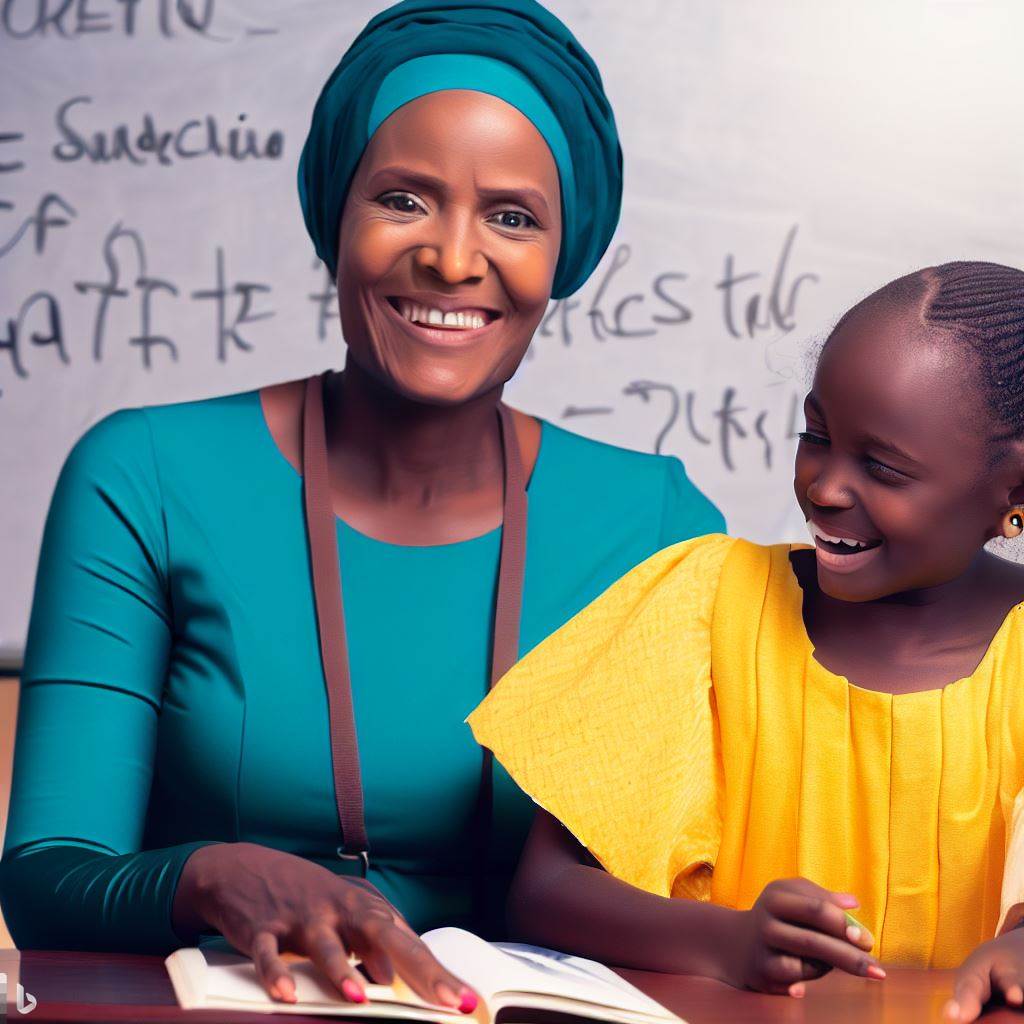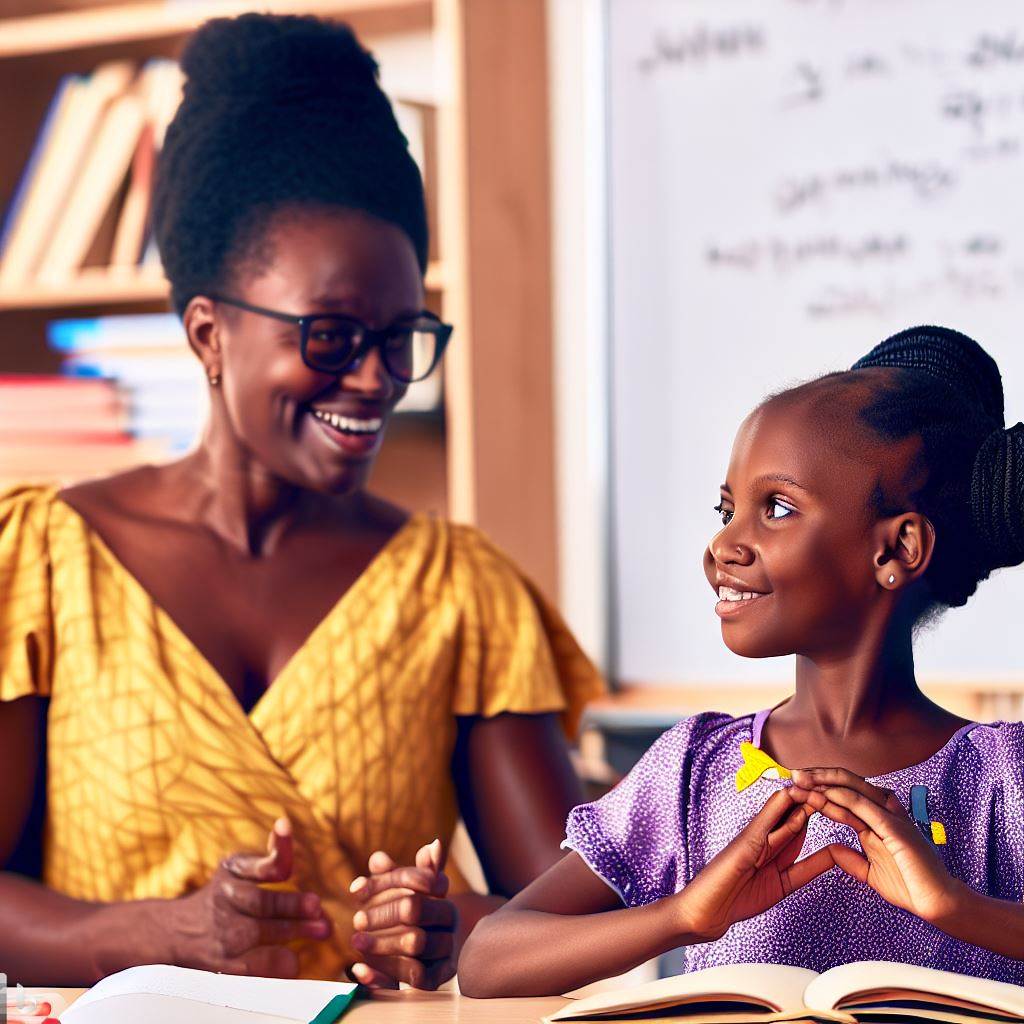Introduction
Building inclusive classrooms is crucial for providing equal educational opportunities for all students.
Inclusive classrooms in the Nigerian context aim to address the unique challenges faced by Nigerian students.
By focusing on the Nigerian perspective, we can better understand the local barriers to inclusivity and develop targeted solutions.
Inclusive classrooms foster a sense of belonging, promote diversity, and enhance overall academic performance.
Nigeria has a diverse population, including students with disabilities, ethnic minorities, and disadvantaged backgrounds.
The Nigerian perspective emphasizes the need to create learning environments that cater to the needs of every student.
Inclusive classrooms facilitate the integration of students with disabilities into mainstream education, promoting their social and academic development.
Teachers play a critical role in building inclusive classrooms by adopting inclusive teaching practices.
Inclusive classrooms encourage collaboration and cooperation among students, fostering positive social interactions.
By valuing and respecting each student’s unique background and abilities, inclusive classrooms promote empathy and understanding.
The Nigerian perspective on building inclusive classrooms highlights the importance of cultural sensitivity and equity.
Inclusive classrooms also benefit students without disabilities by promoting tolerance and acceptance of diversity.
In the end, building inclusive classrooms is essential for creating a more equitable and enriching learning environment for all Nigerian students.
Definition and importance of inclusive classrooms
Inclusive classrooms, known as educational settings that cater to diverse learners, provide equal opportunities for all students.
These classrooms embrace diversity, breaking down barriers to ensure that every student, regardless of their abilities or disabilities, feels valued and included.
The benefits of inclusive classrooms for students and society
The benefits of inclusive classrooms extend beyond individual students, positively impacting society as a whole.
Firstly, inclusive classrooms foster a sense of belonging and acceptance among students. By creating an environment that celebrates differences, students develop empathy, respect, and understanding for one another.
Moreover, inclusive classrooms promote collaboration and teamwork skills, preparing students for the realities of the working world.
Inclusive education also plays a crucial role in dismantling societal prejudices and promoting equality.
By exposing students to diverse perspectives and experiences, they learn to challenge stereotypes and embrace the concept of equity.
Additionally, inclusive classrooms have a significant impact on students’ academic and social development.
Inclusive education enhances academic outcomes as it recognizes and accommodates individual learning styles and needs.
By providing necessary support and accommodations, inclusive classrooms enable students to reach their full potential academically.
This approach reduces stigmatization and segregation of students with disabilities, promoting their active participation in mainstream education.
Furthermore, inclusive classrooms foster social interactions among students, promoting friendships and a sense of belonging.
Students learn to appreciate each other’s strengths, fostering an inclusive and supportive community within the classroom.
Inclusive classrooms also empower students to become self-advocates and develop their self-esteem and confidence.
These students learn to recognize their strengths and talents, realizing that their differences do not define their worth.
The impact of inclusive classrooms on students’ academic and social development
The impact of inclusive classrooms extends far beyond the school years.
Students who have experienced inclusive education are more likely to become tolerant and accepting adults.
They become advocates for social justice, breaking down barriers and advocating for the rights of those with disabilities.
Society as a whole benefits from an inclusive education system that values diversity and inclusivity.
It creates a more tolerant and accepting society, where differences are celebrated rather than marginalized.
Inclusive classrooms contribute to the development of a skilled and diverse workforce, fostering innovation and creativity.
Furthermore, an inclusive education system reduces the burden on specialized institutions, promoting an inclusive and integrated society.
In a nutshell, inclusive classrooms are vital for the academic, social, and emotional development of students.
These classrooms foster a sense of belonging, promote collaboration and understanding among students, and challenge societal prejudices.
Moreover, inclusive classrooms empower students and contribute to the overall development of a tolerant and inclusive society.
By embracing diversity and providing equal opportunities, inclusive classrooms have a transformative impact on students and society at large.
Read: Resources and Support for Special Education Teachers in Nigeria
Challenges to building inclusive classrooms in Nigeria
In Nigeria, building inclusive classrooms faces various challenges that hinder the achievement of inclusive education goals.
Social and cultural barriers that hinder inclusivity
Firstly, the identification of social and cultural barriers remains a significant obstacle to inclusivity in classrooms.
These barriers can include discriminatory attitudes towards children with disabilities, religious beliefs, and traditional practices that perpetuate exclusion.
Lack of awareness and understanding of inclusive education in Nigeria
Moreover, the lack of awareness and understanding of inclusive education among stakeholders, including educators, parents, and policymakers, poses a significant challenge.
Many people in Nigeria still have misconceptions and stigmatizing views towards children with disabilities, leading to their exclusion from mainstream educational environments.
Inadequate infrastructure and resources for implementing inclusive classrooms
Additionally, the inadequate infrastructure and resources for implementing inclusive classrooms present a significant barrier.
Many schools lack ramps, accessible toilets, and appropriate furniture, making it challenging for children with disabilities to access educational facilities.
Furthermore, the shortage of specialized learning materials, assistive devices, and trained teachers hampers the successful implementation of inclusive education.
Furthermore, the absence of proper policy frameworks and guidelines that support inclusive education hinders progress in building inclusive classrooms.
Nigeria needs comprehensive policies that promote inclusive practices, ensure equal opportunities, and protect the rights of children with disabilities to receive quality education.
Overcoming these challenges
In order to overcome these challenges, it is crucial to raise awareness about inclusive education among all stakeholders.
Educating the community about the benefits of inclusive classrooms can help change attitudes and reduce discrimination against children with disabilities.
Furthermore, the government and educational institutions should prioritize allocating funds for the provision of adequate infrastructure and resources.
This includes the construction of accessible buildings, provision of assistive technologies, and training of teachers on inclusive teaching practices.
In addition, collaboration between the government, non-governmental organizations, and community members is essential for the successful implementation of inclusive education.
These partnerships can help mobilize resources, share best practices, and create supportive environments for inclusive classrooms.
Lastly, the government needs to develop and enforce policies that promote inclusivity in education.
This involves incorporating inclusive education principles into national curricula, providing guidelines for teacher preparation programs, and monitoring the implementation of inclusive practices at all levels of the education system.
In general, building inclusive classrooms in Nigeria is faced with challenges related to social and cultural barriers, lack of awareness, inadequate infrastructure, and limited resources.
However, through awareness-raising efforts, provision of necessary infrastructure and resources, collaboration, and policy reforms, Nigeria can work towards achieving inclusive education for all children.
Read: Career Progression Paths for Special Ed Teachers in Nigeria
Government initiatives and policies promoting inclusive education in Nigeria
The Nigerian government has implemented various policies and initiatives to promote inclusive education.
Key strategies adopted by the government to promote inclusivity
One key policy is the National Policy on Education, which emphasizes inclusive education for all children.
The Universal Basic Education (UBE) Act ensures that every Nigerian child has access to free and compulsory education.
The UBE Act also includes provisions for special education needs (SEN) children, ensuring their inclusion in mainstream schools.
The Nigerian government has established the Special Education Department to cater to the needs of SEN children.
The Department collaborates with schools to provide necessary support and resources for inclusive education.
The government has launched the Inclusive Education Initiative to train teachers and administrators in inclusive teaching practices.
This initiative aims to empower educators with the skills and knowledge needed to support diverse learners.
The government promotes partnerships with international organizations to strengthen inclusive education efforts.
These partnerships provide technical assistance, resources, and expertise to enhance inclusive education practices.
The government encourages the involvement of parents and communities in advocating for inclusive education.
Through programs like Parent-Teacher Associations, parents participate in decision-making processes regarding inclusive education.
The government promotes the use of assistive technology and learning materials to support inclusive education.
This includes providing accessible textbooks, audio-visual aids, and assistive devices for students with disabilities.
The government works towards removing physical barriers in schools to ensure accessibility for all students.
Initiatives such as the construction of ramps, accessible restrooms, and classrooms help create inclusive learning environments.
The government prioritizes teacher training and professional development in inclusive education.
Training programs equip teachers with the necessary skills to address the diverse needs of students. The government supports research and data collection on inclusive education to inform policy decisions.
The impact of these initiatives and policies on building inclusive classrooms
Data on the impact of inclusive education initiatives helps identify areas for improvement and further support.
These initiatives and policies have had a positive impact on building inclusive classrooms in Nigeria. More children with disabilities or special education needs have gained access to quality education.
Inclusive classrooms promote diversity, empathy, and equality among students, fostering a more inclusive society.
Students with disabilities are given opportunities to develop their potential and contribute to the community.
Inclusive education encourages integration and interaction among students, creating a supportive and enriching learning environment.
The government’s efforts in promoting inclusive education are crucial in ensuring equal opportunities for all Nigerian children.
However, challenges remain, including the need for continued funding, increased teacher training, and enhanced support systems.
With ongoing commitment and collaboration, Nigeria can further strengthen inclusive education and create truly inclusive classrooms.
Read: The Role of Technology in Special Education in Nigeria

Building Inclusive Classrooms: The Nigerian Perspective
In Nigeria, building inclusive classrooms has become a crucial aspect of providing quality education to all students.
Examples of inclusive schools and their successful practices serve as inspiration and show what can be achieved.
Examples of Inclusive Schools and Their Practices
One remarkable example is the Federal College of Education, Special Oyo. This institution excels in fostering inclusivity through various strategies and approaches.
- They provide specialized training to educators on inclusive teaching methods.
- Adaptive technology is utilized to support students with disabilities.
- Collaboration with parents and caregivers ensures the students’ needs are met both inside and outside the classroom.
- Regular assessments are conducted to monitor progress and tailor interventions accordingly.
Another illustration is the Regina Pacis Model Special School in Anambra State. This school embraces inclusive education and has achieved remarkable success.
- They employ a multi-disciplinary team approach, including educators, therapists, and counselors.
- Individualized education plans are developed to address each student’s needs.
- Collaboration with mainstream schools allows for integration and social inclusion.
- Teacher training programs on inclusive practices are offered to nearby schools.
Successful Models of Inclusive Education in Nigeria
The Inclusive Education Initiative (IEI) in Nigeria is a prominent model that demonstrates the effective practices of inclusive education.
- IEI promotes a whole-school approach, encouraging all stakeholders to participate actively.
- They advocate for policy reform and the implementation of inclusive practices at various educational levels.
- Regular capacity building workshops and conferences are organized to raise awareness and share best practices.
- IEI supports the creation of resource centers for educators to access materials and tools for inclusive teaching.
The Special Needs Education Program (SNEP) in Lagos State is another model showcasing successful inclusive education in Nigeria.
- SNEP incorporates assistive technology to facilitate inclusive learning.
- They offer scholarships and monetary support to students with disabilities, ensuring equal access to education.
- Collaboration with local businesses and organizations provides internship and job placement opportunities for graduates.
- Regular monitoring and evaluation of inclusive practices ensure continuous improvement.
Read: A Comprehensive Overview of Special Education in Nigeria
Insights into the Strategies and Approaches Used by These Successful Schools
The success of inclusive schools in Nigeria can be attributed to their dedication and implementation of effective strategies and approaches.
- Creating inclusive classroom environments that promote diversity, respect, and acceptance.
- Providing ongoing professional development and training for teachers on inclusive practices.
- Collaborating with parents, caregivers, and relevant stakeholders to ensure holistic support for students.
- Individualizing education plans and providing necessary accommodations and assistive technology.
- Regularly evaluating and adapting teaching methods to meet the diverse needs of students.
Building inclusive classrooms can be challenging, but these successful practices and models in Nigeria prove that it is achievable with the right strategies and commitment.
Every child deserves an inclusive education, and Nigeria is taking significant strides towards achieving this goal.
Read: Exploring the Salary Range of Special Ed Teachers in Nigeria
Empowering teachers and educators for inclusive classrooms
Building inclusive classrooms is crucial for ensuring equal educational opportunities for all students, including those with diverse learning needs.
To achieve this goal, it is essential to provide teachers with appropriate training and resources, equipping them with the skills and knowledge needed to create inclusive learning environments.
In this blog section, we will discuss the importance of empowering Nigerian teachers and educators for inclusive classrooms.
Providing appropriate training and resources to teachers
Teachers play a vital role in creating inclusive classrooms by fostering an environment that values diversity.
Appropriate training helps teachers understand and address the specific needs of diverse learners effectively.
Without proper training, teachers may struggle to provide individualized support to students with disabilities.
Training programs should focus on enhancing teachers’ understanding of inclusive education principles and practices.
Teachers need to learn strategies for adapting instructional materials and activities to meet students’ diverse needs.
Moreover, they should be trained on using assistive technologies and accessible teaching methods.
Provision of resources like textbooks, digital materials, and assistive devices can further support teachers’ work.
When teachers have access to appropriate resources, they can better cater to their students’ diverse learning styles.
Skills and knowledge needed for teachers to create inclusive classrooms
To create inclusive classrooms, teachers need to possess a range of skills and knowledge.
- They should be able to recognize and challenge stereotypes, biases, and discriminatory practices.
- Teachers need to be competent in differentiating instruction to meet the diverse needs of their students.
- They should be skilled in using various assessment techniques to evaluate students fairly.
- Collaboration and teamwork are essential skills for teachers, as inclusive classrooms involve working with other professionals.
- Teachers should have knowledge of special education laws and policies to ensure students’ rights are upheld.
- Effective communication and strong interpersonal skills are vital for establishing positive teacher-student relationships.
- Teachers must also be open-minded and willing to continuously learn and adapt their practices.
Professional development programs and resources for Nigerian educators
Nigeria recognizes the importance of inclusive education and offers professional development programs for educators.
The Teacher Development Center provides workshops and training courses on inclusive teaching practices.
Educators can also access online resources like the Inclusive Education Toolkit for practical guidance.
Teacher associations and organizations such as the Nigerian Teachers’ Union organize conferences and seminars on inclusive education.
Government initiatives promote inclusive education, offering grants and funding for professional development.
Collaboration between schools and NGOs can create additional opportunities for capacity building and resource sharing.
Mentoring programs can pair experienced inclusive educators with novice teachers, fostering a supportive learning environment.
Continuous evaluation and improvement of professional development programs are essential to meet teachers’ evolving needs.
All in all, empowering teachers and educators for inclusive classrooms in Nigeria is crucial for providing quality education to all students.
By providing appropriate training, resources, and professional development programs, teachers can develop the skills and knowledge needed to create inclusive learning environments.
It is through these efforts that we can ensure every student, regardless of their abilities or background, receives a fair and equitable education.
Read: Insights into the Teaching Profession in Nigeria Today
Benefits of Inclusive Classrooms for Students
Inclusive classrooms bring about positive outcomes for students, fostering diversity, empathy, and equality.
Positive Outcomes Experienced by Students in Inclusive Classrooms
- Enhanced academic achievement: Inclusive classrooms promote learning opportunities for all students, allowing them to reach their full potential.
- Improved social skills: Students in inclusive classrooms develop stronger social connections and learn to interact with peers from diverse backgrounds.
- Increased self-confidence: Inclusion provides a sense of belonging, boosting students’ self-esteem and confidence in their abilities.
- Enhanced problem-solving skills: Collaborating with diverse classmates helps students develop critical thinking and problem-solving abilities.
- Better classroom climate: Inclusive classrooms create an atmosphere of acceptance, respect, and understanding among students.
Inclusion Fosters Diversity, Empathy, and Equality
Inclusive classrooms create a microcosm of society, allowing students to experience and appreciate diversity.
- Promotes empathy: Students learn to understand and appreciate the experiences and perspectives of their classmates.
- Reduces prejudices and stereotypes: Inclusive classrooms challenge preconceived notions, breaking down stereotypes and promoting equality.
- Prepares students for the real world: Inclusive classrooms equip students with essential skills for a diverse society and globalized workplaces.
Research and Studies Supporting the Benefits of Inclusive Classrooms
Several research studies have highlighted the advantages of inclusive classrooms for students:
“A study by Smith et al. (2018) revealed that students in inclusive classrooms showed significant academic growth compared to those in segregated settings.”
“According to a research review by Johnson and Johnson (2017), students in inclusive classrooms were more engaged and developed positive attitudes towards school.”
These studies provide empirical evidence of the positive impact of inclusive classrooms on students.
In a nutshell, inclusive classrooms bring numerous benefits to students. They enhance academic achievement, promote social skills, boost self-confidence, and develop problem-solving abilities.
Inclusion also fosters diversity, empathy, and equality, preparing students for the real world. Research and studies further support the advantages of inclusive classrooms.
It is essential for schools and educators to prioritize inclusivity to create an enriching and supportive learning environment for all students.
Conclusion
It is crucial to emphasize the significance of building inclusive classrooms in Nigeria. The challenges, initiatives, practices, and benefits discussed highlight the urgent need for inclusive education in the country.
It is essential that further efforts are made to promote inclusivity and ensure that every student has access to quality education.
By doing so, Nigeria can create a more equitable society where every child has an equal opportunity to thrive and succeed.
Inclusive classrooms hold paramount importance:
- Addressing Diversity: Challenges include limited resources and insufficient teacher training.
- Initiatives: Government policies and NGO collaborations promote accessible and equitable education.
- Effective Practices: Differentiated instruction, peer support, and adaptive technology enhance inclusivity.
- Benefits: Empowers marginalized students, nurtures empathy, and prepares all for a diverse society.
Persisting for Progress:
- Embrace Inclusion: Tailor teaching to diverse needs.
- Advocate Collaboration: Partner with peers and specialists.
- Leverage Technology: Adapt tools for diverse learners.
- Foster Empathy: Cultivate respect and understanding.
The journey toward an inclusive education landscape demands commitment. Together, we create classrooms that embrace all.




